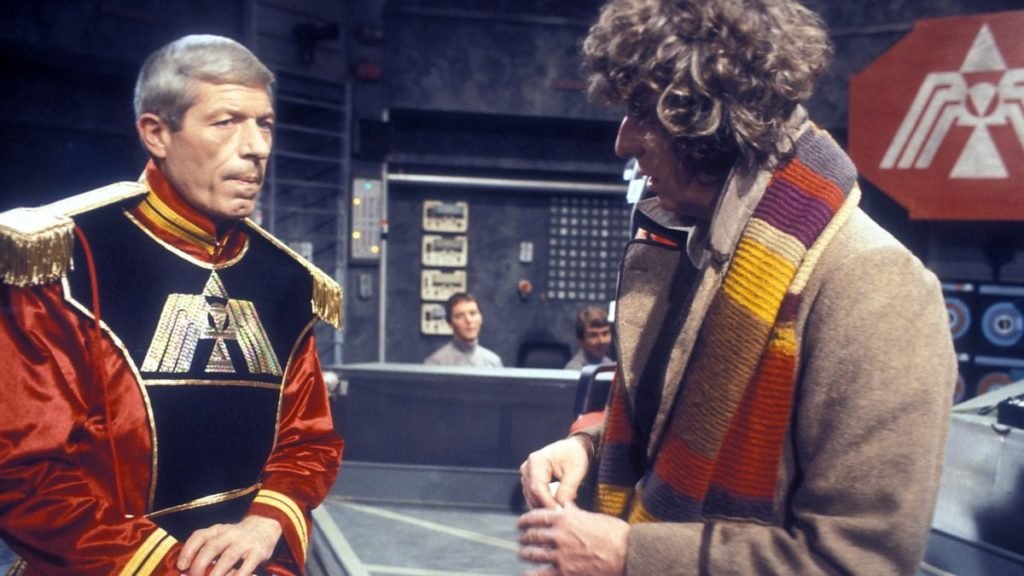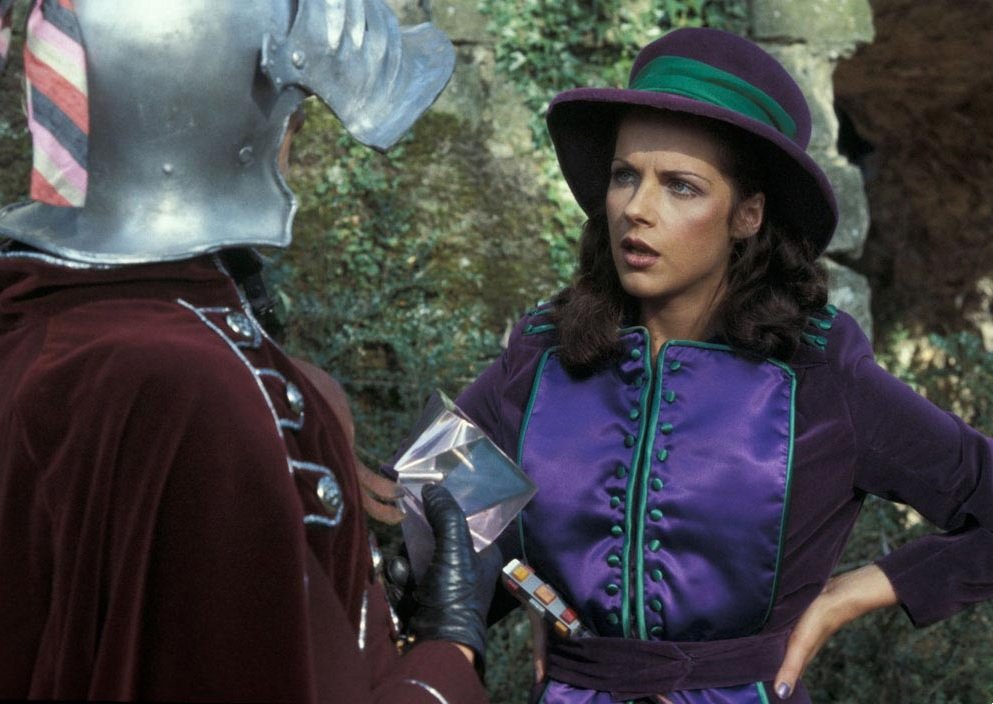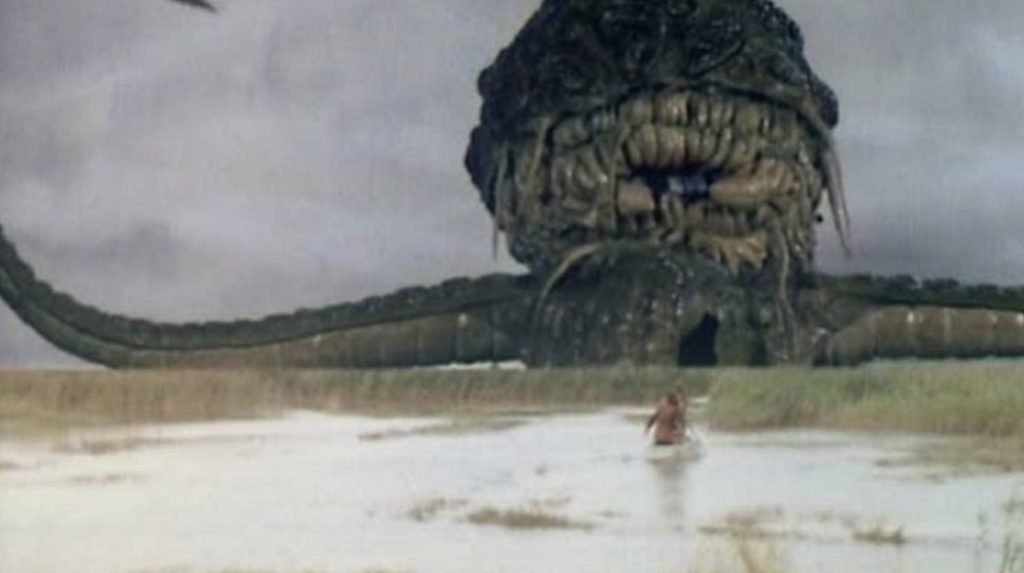Season 16 was, of course, Graham Williams’ attempt to impose some order on the Doctor Who universe: in storytelling, in production, and in curbing the excesses of his increasingly erratic star. Williams found it hard to believe that a fault in the TARDIS’ navigation circuits would cause the Doctor to land in trouble every few weeks. This seems a bit strange when the premise had served the series well for the previous 13 years, but showrunners sometimes have strange ideas. He had intended do the Key to Time story arc in Season 15, but it wasn’t possible – perhaps because the scripts had been already commissioned when he was selected to replace Philip Hinchcliffe at short notice. Williams had also had his hands full with firefighting: scripts falling though (‘The Vampire Mutations’ had to be junked in deference to the BBC’s TV movie of Dracula); a new script editor taking over mid-season, and a directive from on high to cut back the violence in favour of humour. Season 15 was all over the place in quality, with classics Image of the Fendahl and The Sun Makers sandwiched between less, um, successful stories like The Invisible Enemy, Underworld, and that work of desperation, The Invasion of Time.
Determined to avoid such wild changes of tone and quality in Season 16, Williams opted for the strictest running theme yet seen in Doctor Who. The Doctor is sent on a mission to find the missing segments of the Key to Time. There are – guess what – six segments of the key because one segment is found in each story. Who, mused Williams, could send the Doctor on the quest? Not the Time Lords, perhaps, whose use of the Doctor as an unofficial agent had been done to death, and who had lost something of their status as wise guardians of the universe in The Deadly Assassin. So, time to introduce some new Guardians. The Doctor knows of them. The TARDIS is stopped mid-flight in Episode One of The Ribos Operation: when the Doctor demands to know who’s responsible, a kindly voice says, ‘Do you really need to ask?’ The Doctor muses it could be ‘Only a Guardian…’

The opening scenes of Ribos are rather like those of the Star Trek: The Original Series episode, Who Mourns for Adonais? – space traveller(s) encounter god. Instead of a Greek god whose rippling naked torso rivals even William Shatner’s, the Doctor chats to a convivial cove, the White Guardian (Cyril Luckham). The Guardian sips green brandy and explains quietly about the end of order in the universe. What, asks the Doctor, will happen if I refuse the quest? ‘Nothing,’ replies the White Guardian, pleasantly. ‘Nothing? You mean, nothing will happen to me?’ replies the Doctor, surprised. ‘Nothing at all,’ smiles the Guardian. ‘Ever.’ Delivered in a civilised tone, the threat is chilling.
On screen, the Key to Time is sometimes called the Key of Time, presumably because actors and scriptwriters make the occasional slip. These became more noticeable in Season 16, not least because video recorders were widely available with the advent of VHS and Betamax (the latter were early examples of the Zygma Experiments: they led humanity up a technological cul-de-sac). We could, for the first time, confirm that the cast fluffed the lines, that the Mute kicks up a piece of the carpet outside the TARDIS in The Armageddon Factor, and that a shot of the Swampies running through the reeds is used twice in The Power of Kroll.
Back to the story. What is the Key to Time for? To restore the balance between good and evil in the universe. And, um, how does it do that? Wouldn’t restoring the balance involve removing everyone’s free will, before a Guardian was able to switch some from good to evil and vice versa? The Doctor has always opposed such enslavement, however benevolent: ‘Sausages!’ he cries to the Master of the Land of Fiction in The Mind Robber: ‘Man would become a string of sausages, all the same!’ The Doctor recognises the danger in The Armageddon Factor when, affected by the Key, he ‘becomes’ a god. ‘There’s no such thing as free will in the Universe; there’s only my will because I possess the Key to Time!’ raves Baker (fluttering his eyelashes and overacting wildly in a sequence supervised by incoming script editor, Douglas Adams). It’s a good thing the Doctor chucks the Key away, then. Good thing, also, that the Key’s purpose is kept unclear throughout the season – if the Doctor had worked out the implications in Episode One, he’d have scarpered. For all Williams’ commitment to order and structure, the Key to Time story arc is much more chaotic than basing the Doctor’s travels on the unreliability of the TARDIS.

To balance the White Guardian, there has to be a Black Guardian. He seeks the Key, too, for an evil purpose, naturally. He must not get it. Beware the Black Guardian. When the Black Guardian eventually shows up in The Armageddon Factor, he looks like Valentine Dyall rather than Cyril Luckham, which might be why the Doctor spots the difference. The Doctor activates all of the TARDIS’ defences. We know this because the Black Guardian has the line, ‘Doctor! You have activated all of the TARDIS’s defences!’ The Doctor dematerialises, the Key is scattered throughout time and space, and the Doctor realises that the Black Guardian will be on his tail for ever. Williams restores pot luck to the Doctor’s travels with the Randomiser, which, when activated, means that no one will know where he’s going. Not even the Black Guardian. ‘Not even us,’ says Romana drily. Actually, since the TARDIS immediately takes them to Skaro, and then Earth, two of the TARDIS’ favourite destinations, we might wonder why the Black Guardian doesn’t find them at once…
For the second time in consecutive seasons, Williams repeats the problem of writing out the companion. Leela had hardly looked at Andred in The Invasion of Time, falls in love with him in the last two minutes of Part Six. Mary Tamm had made it known that she was only going to be in one season, and Graham Williams apparently kept badgering her to stay. ‘Mary will do another year, won’t you, Mary?’, he said to her daily, and Mary made it quite clear she wouldn’t. Her leaving without being written out was castigated at the time as Tamm’s fault. Martin Wiggins wrote that, if you are in a long running and well-loved show, you have a moral obligation not to cause it continuity problems. The fault was actually with the production team for taking Tamm for granted. It was left to Douglas Adams to solve the problem with the hilarious/unforgivable (depending on your taste) Romana regeneration scene in Destiny of the Daleks.

As for Romana’s character, script editor Antony Reed explained that she was a brilliant young Time Lady/Lord fresh from the Academy with a first class degree. She thought that she knew everything but she lacked experience. ‘I never imagined…!’ she gasps after being attacked by a Shrivenzale in The Ribos Operation. ‘Are there many creatures like that in other worlds?’ The Doctor snaps back at her: ‘Millions! Millions!’ This is a good premise for a companion, but Mary Tamm is miscast. In interviews published before the season aired, she said that Doctor Who wasn’t the sort of programme she would normally consider, and she seems uncomfortable in most of her scenes. Certainly, her range is limited. It’s been suggested that some actors thought science fiction and Doctor Who so ridiculous that it wasn’t worth bothering to give a convincing performance: certainly, occasional bad acting was the bane of many Seventies stories. While other actors – Timothy Bateson, Paul Seed and Iain Cuthbertson in Ribos, for example – are committed absolutely to selling the truth of the story, Tamm’s performance lacks any such commitment. If only they had cast Lalla Ward as Romana for Season 16: Ward could convincingly play arch, snooty, and vulnerable, and show Romana’s development as she learns to substitute experience for book learning.
Season 16’s stories are generally of a high quality. The Ribos Operation is a delight: Robert Holmes, who knew the show backwards, gave of his best in drama, tension, and comedy. There is another fine Holmesian double act in Garron and Unstoffe, paralleled by their wicked counterparts the Graff Vynda-K and Sholakh. Timothy Bateson is especially touching as Binro, the Galileo of Ribos forced to recant his absurd belief that his planet orbited the sun.

The Power of Kroll, Holmes’ second script for the season, is much less sure-footed. Holmes was presumably hampered by Antony Read’s insistence that the story included ‘the biggest monster ever to appear in Doctor Who’. Holmes does his best. The treatment of native Americans in the 19th Century is paralleled in the Swampies’ eviction to a reservation on the third moon of Delta Minor, but the budget – inevitably – couldn’t rise to the effects required. The Refinery model was about 4 feet across: Tony Harding, the visual effects designer, lamented that it actually looks smaller on screen. A very young cameraman, Harding recalled, was given wrong information about how to achieve a soft-edged wipe. The resulting composite shots of the monster Kroll with the live action are bisected by a hideous black line that caused gaffaws among my school friends and a certain amount of teasing at school the next day.
Douglas Adams’ The Pirate Planet is wonderfully inventive and overflowing with good science fiction ideas: in fact, there is enough there to fill a whole season. Bruce Purchase is excellent as the Captain, and Andrew Robertson suitably worm-like and pathetic as Mr Fibuli. I remember cringing with embarrassment on first broadcast at the Mentiads, especially when they ‘throw’ the Doctor to the wall with ‘good vibrations’ at the end of Episode One. In fact, they scowl at him a bit and Baker slides to the floor. Keen to pair Tom Baker’s maniacal improvisation with Adams’ inventiveness and flair for comedy, Williams offered Adams the post of script editor. Kim Newman wrote that the show jumped the shark at this point. Season 17’s quality veers about even more crazily than season 15’s: City of Death is juxtaposed with the risible Creature from the Pit and the money had completely run out by Nightmare of Eden (It’s time to meet the Mandrels/ It’s time to dress up right/ It’s time to get things started on the Mandrel Show tonight) and The Horns of Nimon.
The Stones of Blood won the Doctor Who Appreciation Society season award for best story, which I found ridiculous at the time. The story was bedevilled by production problems and strange directorial decisions. The Ogri are absurdly realised as pieces of stone on castors, pushed into shot by the crew; Vivien Fay has been painted silver for no reason at all for her arrival on the spaceship. Tom Baker sabotaged the end of Episode One when he refused to film the Doctor (actually, Cessair of Diplos in disguise) pushing Romana over the cliff. The cliffhanger (geddit?) makes no sense at all, and we can hardly blame Tamm for being her most unconvincing in this most unconvincing of sequences. ‘Hulp,’ she whines, ‘hulp me somebody, hulp me.’

The Androids of Tara is great and Peter Jeffrey is excellent as Count Grendel. ‘Next time, I shall not be so lenient!’ he cries, just before diving off the battlements in a sequel-hunting exit. Alas, the sequel never materialised. I enjoyed The Armageddon Factor as a schoolboy, particularly John Woodvine as the Marshal and William Squire as the Shadow, both strong villains in a suitably dark story. Drax (Barry Jackson), the Time Lord from Brixton, was so good you forgot he was there to pad out the running time. His calling the Doctor ‘Theta Sigma’ was controversial in 1978, as so many fans thought this was the Doctor’s name and that the last mystery about him had been revealed. Terrance Dicks suggested in his novelisation that Theta Sigma was the Doctor’s designation at the Academy, but this was not mentioned on screen: another example of loose ends in a season that intended to tighten up the storytelling.
I have great affection for Season 16, and, Mary Tamm and dodgy sequences notwithstanding, it is one of my favourite of all 37 seasons. Tom Baker was taking the material much more seriously than he did under Adams’ script editing; there were some strong stories and the actual look of the show was often very good. (Although Williams said he had to keep finding reasons to shoot onto the studio black drapes: a good drinking game in Seasons 16 and 17 is to have a shot every time the action takes place against a black void – not that we encourage such behaviour, you understand.) Doctor Who did, I think, suffer from the BBC’s insistence that there was to be no more Gothic horror, and Williams valiantly, and with considerably success, filled the gap with humour and intelligent scripting. But Season 16 was the season when my schoolfriends started to drift away from the programme. They missed the Gothic horror of Hinchcliffe, and complained that the programme just wasn’t as good any more (shades of Season 37, or modern-day Series 11). Williams might have had his hand more firmly on the tiller, but Douglas Adams, Tom Baker, and production problems – not least, rampant inflation and industrial action – wrenched the tiller away in Season 17. As he said later, ‘We would be tearing our hair out in the gallery while Tom went through his antics on the floor.’ Then Shada was cancelled and John Nathan-Turner took over… and that’s another story.
NEXT: Mostly harmless.
